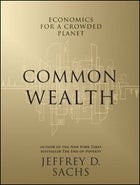Jeffrey Sachs’s 2005 bestseller The End of Poverty laid out a blueprint for eliminating extreme impoverishment. It also brought Sachs, a Columbia University based economist, international celebrity, attracted rock starsbuenos días, Bono!to his cause, and made African development a hot topic. In Common Wealth: Economics for a Crowded Planet (The Penguin Press, $28), Sachs rolls out solutions to a few of the earth’s other nagging issues, from environmental destruction to overpopulation. BRUCE BARCOTT checked in with the world’s coolest free-market maven.
Common Wealth: Economics for a Crowded Planet by Jeffrey Sachs
 Want it? Get it
Want it? Get it
OUTSIDE: Is this book a sequel to The End of Poverty?
SACHS: Ending extreme poverty is like scaling a mountain. When you get to the top, you see that there’s a chain of mountains behind that one. Common Wealth is a map to get us across.
How did we get to this point?
We’re living in a unique era. We’ve done so well with our technological development that we have created the capacity to destroy the physical base of our society and imperil our survival. We should aim to stabilize the population, switch to sustainable-energy technologies, and negotiate new global agreements.
In the book, you list “travel” as something that individuals can do to help matters.
That came from my own experience. I’d been a professor in this field for 15 years, but I didn’t understand just how extreme poverty and deprivation could be until I went to Africa and worked there.
So
Lonely Planet is the solution?
Fear is the biggest danger we face. When you’re afraid, you’re on the defensiveor in a preemptive offensebut you’re not in an understanding mode of thinking. Travel, and experiencing diverse cultures, is a powerful way to overcome that fear.

